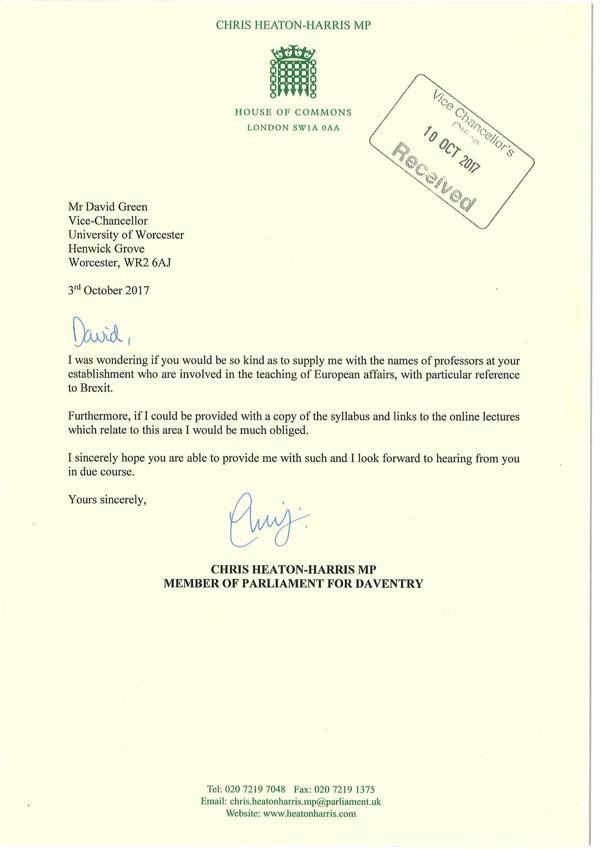A year after a "dangerous attack" on academic freedom by a Government whip, which was exposed by the Vice Chancellor at the University of Worcester, the Information Commissioner has delivered a significant victory for free speech.

The Commissioner has found in favour of the University in refusing to release "all emails within the account of the Vice Chancellor, or anyone who provides him with administrative support, which contain the word "Brexit"".
In her judgement, the Commissioner stated: "If the university is required to put this information into the public domain, the Commissioner agrees that those views would be likely to be much more cautious and risk averse in the future and those concerned would be inhibited from providing a free and frank exchange of views for the purposes of deliberation."
The Freedom of Information request was one of several received by the University following the controversy surrounding a letter, sent to all university Vice Chancellors, from Chris Heaton-Harris MP, which requested a list of all academics who were teaching on the subject of Brexit, together with copies of the syllabus and links to the course.
Mr Heaton-Harris MP, who is currently a junior Minister in the Brexit Department, was a senior Government whip when he sent the letter in October 2017.
In response, Professor Green refused to provide the information, arguing that Mr Heaton Harris" approach was challenging to the concept of freedom of speech and academic freedom, which is the cornerstone of the UK's university education system.
The controversy, which was reported around the world, led to several further attempts to obtain the information under the Freedom of Information Act. The University treated each on their merits and refused to divulge any names.
However, one particular "sinister" attempt requested the University to disclose emails to and from the Vice Chancellor and made a series of allegations.
After reviewing all the arguments and the relevant law in a carefully reasoned 10 page judgement, the Information Commissioner concluded that disclosing his emails "would inhibit the free and frank exchange of views for the purposes of deliberation, and would be likely otherwise to prejudice the effective conduct of public affairs". And in response to allegations that the Vice Chancellor might be "using public resources to support personal political campaigning" she found "no evidence of this".
The Commissioner's reasons also stated that: "Furthermore, it is the Commissioner's view that staff and other third parties, such as Universities UK must have the confidence that they can share views with one another and that there is an opportunity to understand and discuss, issues which may affect them."
The University has welcomed the Information Commissioner's ruling.
Vice Chancellor, Professor David Green, said: "I am delighted that the Information Commissioner has found that the University has behaved properly and lawfully in this matter. This was a further attempt to use the Freedom of Information Act (2000) in a way which would, in my view, have been deeply against the public interest and inhibited the free flow of ideas which is so valuable in informing decision making and creating a democratic and inclusive University."
He added: "The attempt by a member of Her Majesty's Government to establish a comprehensive information base containing all University academics in the UK teaching on Brexit with their names, syllabi and course material, was a deeply dangerous initiative. It runs directly contrary to the entire history of free enquiry, teaching and research which is an essential ingredient of a modern democracy. Members of the Government have a particular responsibility and duty to protect academic freedom within the law not to circumscribe it.
"Following this ruling, I trust that university leaders throughout the country will be more resolute than ever to stand up for academic freedom and to be confident that the law supports us in performing this vital duty. It is particularly important that we stand up to such requests from national political sources, regardless of party affiliation."
Relevant links: